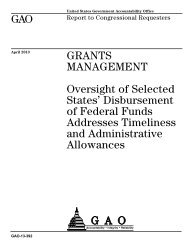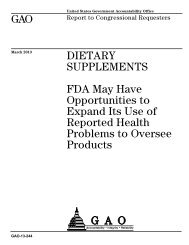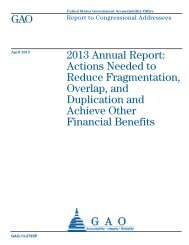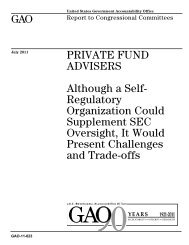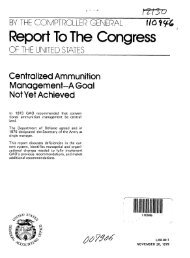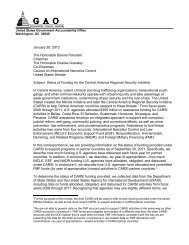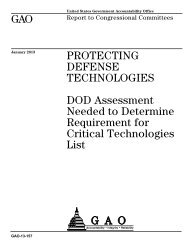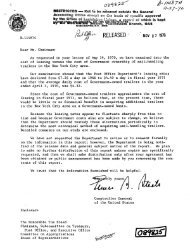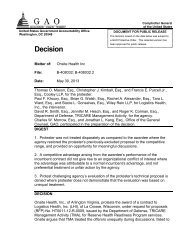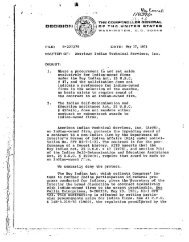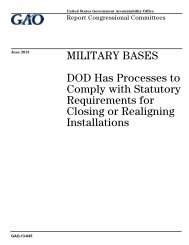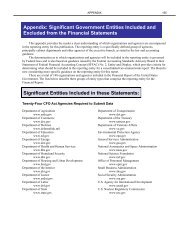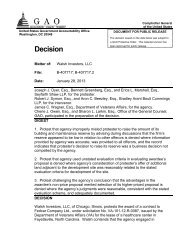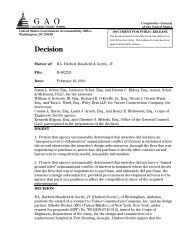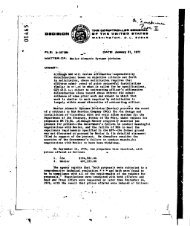Decision - US Government Accountability Office
Decision - US Government Accountability Office
Decision - US Government Accountability Office
Create successful ePaper yourself
Turn your PDF publications into a flip-book with our unique Google optimized e-Paper software.
United States General Accounting <strong>Office</strong><br />
Washington, DC 20548<br />
<strong>Decision</strong><br />
Matter of: Sterling Services, Inc.<br />
File: B-286326<br />
Date: December 11, 2000<br />
Comptroller General<br />
of the United States<br />
Walter Bull for the protester.<br />
Lt. Col. LeEllen Coacher, Department of the Air Force, for the agency.<br />
John L. Formica, Esq., and James A. Spangenberg, Esq., <strong>Office</strong> of the General<br />
Counsel, GAO, participated in the preparation of the decision.<br />
DIGEST<br />
Agency reasonably determined protester’s past performance deserved a “very good”<br />
rating, based on the references in the protester’s proposal, rather than the<br />
“exceptional” rating the protester asserted it deserved.<br />
DECISION<br />
Sterling Services, Inc. protests the award of a contract to Northwest Florida<br />
Facilities Management, Inc. (NFFM) under request for proposals (RFP) No. F08637-<br />
00-R-7007, issued by the Department of the Air Force, for transient aircraft services<br />
for Tyndall Air Force Base (AFB), Florida.<br />
We deny the protest.<br />
The RFP provided for the award of a fixed-price contract for a base period of 1 year<br />
with four 1-year options. The successful contractor is required to provide all<br />
personnel, equipment, tools, supervision and other items required to perform the<br />
transient aircraft services. RFP at 2-4.<br />
Offerors were informed that the agency would utilize a “Technically Acceptable-<br />
Performance/Price Tradeoff (TA-PPT) source selection procedure” to select the<br />
proposal that represented the best value to the government. RFP at 23. The RFP<br />
explained that under the TA-PPT procedure, the proposals would be evaluated for<br />
technical acceptability under the staffing/equipment and quality control plan<br />
evaluation criteria, and that the proposals would be evaluated under the past<br />
performance criterion as either exceptional/high confidence, very good/significant
confidence, satisfactory/confidence, neutral/unknown confidence, marginal/little<br />
confidence, or unsatisfactory/no confidence. RFP at 23-24. The RFP stated that in<br />
determining which technically acceptable proposal represented the best value to the<br />
government, past performance would be “considered significantly more important<br />
than price.” RFP at 23. The RFP also advised offerors that, although the agency<br />
reserved the right to conduct discussions if necessary, it planned to make award on<br />
the basis of initial proposals. RFP at 20.<br />
The RFP (at 22) included instructions for the preparation of proposals, requesting,<br />
among other things, that offerors<br />
[s]ubmit past performance information . . . that is relevant for the last<br />
three years. Include past performance history and experience on<br />
contracts of this type and magnitude with the government and/or<br />
commercial market. All available information pertaining specifically to<br />
these criteria should be included, as well as any other information the<br />
offeror feels would demonstrate their ability to accomplish this<br />
project.<br />
The agency received 11 proposals by the RFP’s closing date and evaluated 6 of<br />
the proposals, including those submitted by Sterling and NFFM, as technically<br />
acceptable. Sterling’s proposal was rated as “very good/significant confidence”<br />
under the past performance criterion at a proposed price of $1,704,144, and NFFM’s<br />
proposal was rated as “exceptional/high confidence” under the past performance<br />
criterion at a proposed price of $1,739,498. Agency Report, Tab 4, Proposal<br />
Evaluation Report.<br />
The contracting officer found that NFFM’s proposal represented the best value to the<br />
government, noting that NFFM was “performing exceptionally on current TA<br />
[transient aircraft] service contracts” at three other Air Force bases, and that<br />
because of this, “essentially no doubt exists that [NFFM] will successfully perform<br />
the required effort.” The contracting officer added that, although NFFM’s price was<br />
2 percent higher than Sterling’s low-priced proposal, the “superior past performance<br />
of the higher priced offeror outweighs the small cost difference.” Id.<br />
Sterling (the incumbent contractor) argues that the agency’s evaluation of its past<br />
performance was unreasonable, contending that its past performance should have<br />
been evaluated as “exceptional/high confidence.” Protest at 2. According to the<br />
protester, Tyndall AFB personnel have rated Sterling’s past performance as<br />
“exceptional” on a number of occasions when contacted by other contracting<br />
activities. Protest at 2; Comments at 1.<br />
The evaluation of past performance is a matter within the discretion of the<br />
contracting agency. In reviewing an agency’s evaluation of past performance, we<br />
will not reevaluate proposals, but instead will examine the agency’s evaluation to<br />
Page 2 B-286326
ensure that it was reasonable and consistent with the solicitation. Acepex<br />
Management Corp., B-283080 et al., Oct. 4, 1999, 99-2 CPD 77 at 3.<br />
Sterling’s proposal included information on transient aircraft services contracts<br />
performed at Tinker, Tyndall, Anderson, and Seymour Johnson AFBs. This section<br />
of Sterling’s proposal included relevant points of contact, Sterling’s summary of the<br />
contracts’ requirements, and completed Contractor Performance Assessment<br />
Reports (CPAR) for the Tinker, Tyndall, and Anderson AFB contracts that were<br />
signed by the relevant agency representatives and Sterling’s president. These CPARs<br />
included a table that set forth various areas for evaluation (such as “quality of<br />
product/service”), under which Sterling received ratings ranging from “very good” to<br />
“exceptional” with regard to Tyndall and Tinker AFBs, and “satisfactory” to “very<br />
good” with regard to Anderson AFB. Sterling commented in this section of its<br />
proposal that “the past performance of the above-referenced Contracts should be<br />
evaluated at the ‘Very Good/Significant Confidence’ rating based on the definition<br />
that the offeror’s performance record indicates that there is little doubt that the<br />
offeror will successfully perform the required effort.” Agency Report, Tab 8, Sterling<br />
Proposal, Past Performance Information.<br />
The agency forwarded “past/present evaluation” forms to Tinker, Tyndall, Anderson,<br />
and Seymour Johnson AFBs as part of its evaluation of Sterling’s proposal under the<br />
past performance criterion. These forms listed 12 areas (such as “Contractor’s<br />
quality of work”) on which Sterling’s performance was to be rated as exceptional,<br />
very good, satisfactory, neutral, marginal, or unsatisfactory. Agency Report, Tab 9,<br />
Sterling’s Past Performance Surveys.<br />
Sterling received ratings of “very good” under all 12 areas of evaluation from Tinker<br />
AFB, and “very good” or “exceptional” under the 12 areas from Tyndall AFB. The<br />
record does not contain a survey response from Anderson AFB, and Seymour<br />
Johnson AFB, while providing some positive comments regarding Sterling’s<br />
performance, declined to evaluate Sterling because the firm had been performing the<br />
relevant contract for only a few months. Id.<br />
Based upon the record here, we have no basis upon which to find unreasonable the<br />
agency’s evaluation of Sterling’s past performance as “very good” rather than<br />
“exceptional.” The record reflects that Sterling’s past performance received ratings<br />
that primarily ranged from “very good” to “exceptional” from Sterling’s references,<br />
and that the ratings set forth on the CPARs provided by Sterling in its proposal<br />
ranged from “satisfactory” to “excellent.” Although Sterling may be correct that<br />
Tyndall AFB has recently evaluated Sterling’s past performance as “excellent” when<br />
contacted by other contracting activities, the record also includes CPARs dated<br />
within the last 3 years that were prepared by Tyndall AFB and signed by Sterling’s<br />
president that evaluate Sterling’s performance as ranging from “marginal” to “very<br />
good,” with most of the areas being rated as “satisfactory.”<br />
Page 3 B-286326
The protester complains that it “was not notified . . . that there was any problem with<br />
[its] past performance at Seymour Johnson AFB,” and that this should have been<br />
raised with Sterling during discussions. Protest at 2. This contention is premised on<br />
a flawed factual assumption. The record does not support the protester’s view that<br />
there was any “problem” with its performance at Seymour Johnson AFB that needed<br />
to be addressed. Rather, the record reflects that Seymour Johnson AFB was pleased<br />
with the protester’s performance, but declined to complete the past performance<br />
evaluation form because, as noted above, Sterling had been performing the relevant<br />
contract for only a few months. Accordingly, we find that this contention is without<br />
merit.<br />
The protester contends that the agency determination to award the contract to<br />
NFFM based upon its higher-rated, higher-priced proposal was unreasonable. We<br />
disagree. As explained above, there is no reason to object to the agency’s evaluation<br />
of NFFM’s proposal as “exceptional/high confidence” and Sterling’s proposal as<br />
“very good/significant confidence” under the past performance evaluation criterion.<br />
Given that the RFP stated that the past performance would be “considered<br />
significantly more important than price” in determining which proposal represented<br />
the best value to the government, and the reasonable explanation in the agency’s<br />
award selection document as to why NFFM’s higher-rated proposal was worth its<br />
slightly higher price, Sterling’s contentions here provide no basis for overturning the<br />
award determination. Matrix Int’l Logistics, Inc., B-277208; B-277208.2, Sept. 15,<br />
1997, 97-2 CPD 94 at 14.<br />
The protest is denied.<br />
Anthony H. Gamboa<br />
Acting General Counsel<br />
Page 4 B-286326



